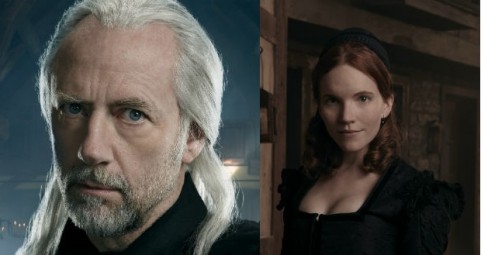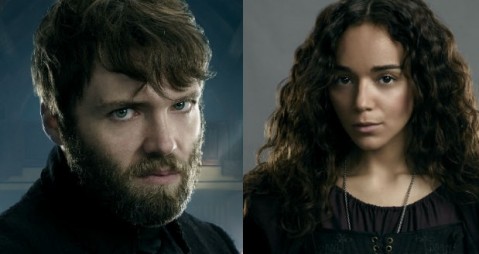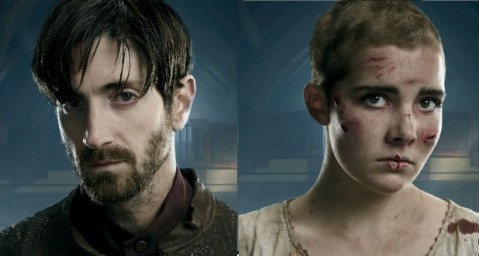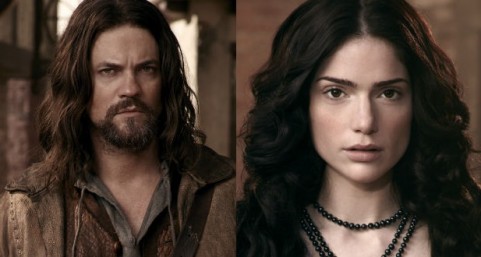The Light from the TV Shows: Chatting with the Cast of WGN’s ‘Salem’
For years, WGN has been a network that’s gotten precious little notice from most cable subscribers outside of Chicago, but in recent years, they’ve been trying to expand their viewership through moves like, for instance, serving as the exclusive U.S. home of the long-running Canadian comedy, Corner Gas. Unfortunately, that didn’t turn out to be the ratings-grabber that they’d hoped it might be, but things are on the upswing now that the network has branched out and begun their own original programming, kicking off their new roster with the supernatural period-piece drama Salem.
Bullz-Eye was invited to visit the set a few weeks back, and we were amazed at how well they’ve captured the look and feel of the era, but we were a little bit thrown when we discovered that our interview ops with the cast members were to be done on camera…even if we weren’t going to be using the footage! Still, we had four very nice chats during the course of the day, each featuring two cast members, and we got a bit of insight into how each of them came to join the series, who their characters are, and what we can expect from Salem as the series rolls through its first season.

Xander Berkeley and Tamzin Merchant
Bullz-Eye: Had you both been actively looking for series work when this came about?
Xander Berkeley: Serious work or series work? [Laughs.]
Tamzin Merchant: I’m always constantly looking for work wherever! I’m always surprised if anyone wants to cast me in something. [Laughs.] I’m always, like, “Really? Okay! Cool! I’ll do it!”
BE: What was it about this particular project that appealed to you?
TM: That they wanted to hire me. [Laughs.] No, I’m joking. I just loved the script, and I loved the world. I loved that the magic meets history, and…it’s been really cool for that reason.
BE: Xander, you actually had some hesitations about signing onto the series at first.
XB: Well, you know, partly because I have a family, and it’s a long way away, so I was a little concerned on that front. My wife (Sarah Clarke) acts and works a lot, and there were certain projects that were pending for her, and we can’t both be away. So those were the only real concerns. The script was spellbinding from day one, and the project is awesome. I’m so glad to be part of it.
BE: Can you talk a bit about the character of Anne?
TM: Anne is a freethinking, forthright, curious young woman who isn’t satisfied by being told to sit down and shut up, as a Puritan young woman should. So she has questions that she wants answered, and no one is really very willing to her about them. So I think in the beginning we meet her as a young woman on the cusp of womanhood, and on the cusp of answers, hopefully. Well, as we go through the first season, I think she’s getting closer to the answers. About who she is as much as about who everyone else is.
BE: And Magistrate Hale, in a nutshell?
XB: It’s hard to put him in a nutshell. He’s a very complicated, torn character who has allegiances in both camps. He’s a magistrate, a representative of the law, and a selectman, a town leader among the Puritans. But he has a family background in the pagan world, and he’s having to balance these two worlds at a time when things are going into extreme high-gear conflict.
BE: Tazmin, you seem to have somewhat of a penchant for period pieces…or, at the very least, you seem to have more of a history with them on your filmography than anyone else in the cast.
TM: Is that true? [Laughs.] Well, I was told once that I have a period face, which I wasn’t quite sure how to take, but…I think period has a penchant for me, rather than me having a penchant for it. As I say, I’m just constantly surprised and delighted when someone wants to hire me, but I’m always honored to be cast in a project that I’m interested in. So, yes, I guess I have done a lot of period drama. There’s so much in England. I mean, I’ve been out of a corset about three times, I think! But it’s great to do something new – this is my first job in America, and it’s also my first job in a witchcraft kind of realm, which is really exciting. So although I am visiting period again, it’s with a whole new slant, which is really cool.
BE: How has it been to work on the series? Based on the pilot, it looks like it’s going to be a pretty wild, intense ride.
TM: It is! It’s an intense show to work on, because the subject matter is quite dark and dangerous. But, you know, people’s passion… Everyone from the background artists to Joseph Pile to Michael Goye and the guys who designed the set and built it, everyone has passion to see this project to succeed and be everything that it can be. So that is really energizing and great.
XB: Yeah, I’ve known Adam Simon – the progenitor, the guy that had the concept in the first place and is one of our writers and executive producers – for…28 years? Something like that. Since I did The Necromancer’s Wife, his USC student project. I love him dearly. We both waited until later to have kids, so our first kids were born two weeks apart. So I’m thrilled for Adam, because I think he’s one of the most talented, intelligent, lovely people out there. He’s been toiling in the mines of screenwriting and doing a lot of other stuff, but this magical world that he’s created for Salem is a reflection of 30 years’ work in a particular direction. The folklore, the history, and the black arts in general have obsessed him, he knows more about it than anyone around, and he’s passionate about bringing the world to life. And the timing couldn’t be better, really, because we’re tired of vampires and zombies, aren’t we? [Laughs.] I’m kidding!

Seth Gabel & Ashley Madekwe
Bullz-Eye: So were either of you actively looking for a series when this opportunity came about?
Ashley Madekwe: I’m always actively looking to pay my rent.
Seth Gabel: [Laughs.] Yeah, I mean, I was hungry for something I could really sink my teeth into, and this was the best thing.
BE: And you’d actually just come off doing a pilot that was equally spooky: Gothika.
SG: Yeah, and with Janet Montgomery, too!
AM: That’s weird!
BE: Could you each talk a bit about your characters? Starting, I guess, with Cotton Mather.
SG: Cotton is a reverend, a theologian, a scientist, a witch hunter, and a hypocrite. He’s charged with finding the witches in Salem, but at the same time, as he’s searching with these demons around him, he has to confront the demons within himself. And by having that conflict within himself, he just needs some kind of outlet to feel like he’s alive, so he turns to drink and prostitutes and all kinds of stuff.
BE: You actually had probably the most background to go on, as far as characters go. Did you do a lot of deep research?
SG: I did! Cotton Mather was very prolific with his writing, so I was able to get a view inside of his head, and what I found was that he was curious about the world. He was curious about nature and the frontiers of science and philosophy. And that’s something I wanted to give to the character: he’s in this oppressive, puritan, fundamentalist regime, but at the same time he’s a man of reason and is questioning all of those things…and questioning his own nature. So he’s kind of tortured by what he’s discovering and what he’s finding, but at the same time there’s a glimmer of hope that perhaps there is a better way. And I feel like the John Alden character brings that out in him.
BE: And your character, Ashley?
AM: Tituba is Mary Sibley’s servant to the outside world. Behind closed doors, Tituba couldn’t be further from a servant. She doesn’t do any cleaning. [Laughs.] She is the catalyst for Mary in joining the hive of witches, and historically Tituba was the first person accused of witchcraft, and she admitted to it…willingly, I guess. And she accused others. But she wasn’t tried for her crimes, and she wasn’t hung and wasn’t imprisoned. She kind of walked free. So there’s that mysterious element: we don’t really know what happened to Tituba after that. In our story, Mary and Tituba are working toward the Grand Rite.
BE: The series is pretty intense, just based on the early episodes. Did you anticipate that, based on the script, or did it turn into something more once you actually saw how it played on the screen?
SG: Thankfully, it became even more intense. I mean, I felt like when we put it on its feet, the stakes got even higher, which I was glad about. You always have concerns when you go into a show. “Okay, that’s what’s on the page, but are the network and the studio really going to be willing to go there?” And with this, we found that not only was there support to push the envelope, but we found that on the day we were able to take it even further, but also do it from a place of truth, and things being driven from real circumstances and motivation and relationships between the characters and the set pieces of what’s going on in the story.
AM: I enjoy telling the story that we have, and I felt really pleased by how the pilot turned out. Sometimes when you read a script, it doesn’t… The realization isn’t everything you thought it could be. But I thought it was everything it could be and more. If anything, it was darker.
BE: You’re still filming the scenes, but you’ve done a few episodes at this point. How have you felt about the evolution of your characters thus far?
AM: I’m really excited by it. I think that the pilot gives a good insight to where Tituba is and into Tituba and Mary’s relationship is, and we go even further with that. You see it develop more, you get a real sense of these two women being empowered by the things that they’re doing and the sensuality behind their magic and the lust they have for the Grand Rite. I think that you get a real sense of that, and I’m really happy with the way the writers are telling that story.
SG: I think that if the Cotton Mather of Episode One were to meet the Cotton Matthew of Episode Nine, which is what we’re filming right now, he would be shocked at how different he is and has become. It’s closer to his true nature, but I think he would be surprised by how different he’s become.
BE: When the series wraps for the season, is it going to be a terrible cliffhanger?
AM: We don’t know! [Laughs.]
SG: We don’t know yet. We’re kind of along for the ride. Fortunately, we trust the writers, because they do such a great job week to week. But, yeah, we’ll be as surprised as everyone else!
AM: I love that, at the each episode, there has been lots of… [Gasps.] …moments for me in reading it. Even though I’m in it, I still have those moments. I feel like they’re really good at kind of keeping us dangling at the end of each episode…so I can only imagine what they’ll do at Episode 13!

Iddo Goldberg & Elise Eberle
Bullz-Eye: When this came about, were you both actively looking for series work, or was it just intriguing?
Elise Eberle: It was completely intriguing.
Iddo Goldberg: Yeah, the first episode read so… I mean, it was…
EE: A page-turner.
IG: Yeah, I mean, it was so fun to read. You know, a lot of the stuff you get, by, like, Page 12, you start flipping to Page 13, 14, 15…
EE: You’re, like, “Where’s my part?”
IG: [Laughs.] No, I mean, you’re just looking at the page numbers. But this just moves. [Snaps fingers.] And it moves from the word “go.”
EE: It’s exciting!
IG: And I feel like so many of the characters really jump off the page, and you really get to discover people’s afflictions and traumas, what they’re going through and what they want to achieve. I think the pilot, the first episode, really engages people. I think it’s going to be very challenging to watch the first episode and not to be intrigued to come back and see what happens in the second.
BE: Having seen the first episode, I would agree with that.
EE: [Claps hands.] Yay!
IG: That’s great to hear.
BE: It’s very intense.
EE: It is intense!
BE: In fact, I was curious: was it more intense when you actually watched it than you’d been expecting when you originally read the script?
EE: Yeah! I mean, there’s a lot of moments in that script where you sort of just read through it, you play through it, and…
IG: You’re hoping that they’re going to encapsulate that, but…
EE: Yeah, you’re, like, “Okay, well, I hope they will.”
IG: Unfortunately, many times you do see that in scripts, but they don’t get what’s on the page onto the screen. And when we watched the first episode, I was just, like, “Yes! They got this right!”
BE: So can you each talk a bit about your characters, describing them in a nutshell?
EE: Well, I play Mercy Lewis, who is the mysteriously afflicted young girl who also happens to be the reverend’s daughter. So she’s a very pure and innocent young girl, and she’s the one who basically initiates the hysteria. She causes a commotion, as it were. [Laughs.]
IG: My character, Isaac, gets shamed and alienated, and he carries this shame and guilt with him, and…I feel like he desperately wants to be involved in what will hopefully one day save Salem, because he thinks it will rid him of the shame that he carries.
BE: Over the course of the series, is there considerable evolution to your characters? Were you happy with the way they moved along?
EE: Oh, my God, I was just saying, actually, how both of our characters… When you see the first episode, you have no idea where our characters are going to go, and… I mean, I can say at least for me that it evolves to somewhere where I just never anticipated! [Laughs.]
IG: I think that as well. My character’s really considered to be a heathen in society, and just to be around these important, powerful people within that society, I don’t think he ever would’ve expected to be involved in such a way. And he’s in contact with these people on a regular basis now, and I think there was no way he could’ve expected that. And I’m thrilled with that.
BE: Were there any challenges to the period-piece aspect of the series?
IG: Well, you know, you’re always trying to… It’s very hard to play a period, and it’s very hard to play the magical and mysticism element of it. I think that, as an actor, you really just want to play the emotional journey of the character.
EE: But you have to authenticate the time period as well, and I think to sustain that…well, I think just the clothes are a help to that as well, just with the posturing.
IG: Yeah, from an external point of view, you have the props, the costumes, and the like. But internally, I can only play what he’s going through.

Shane West & Janet Montgomery
Bullz-Eye: So when this opportunity came out, were both or either of you actively looking for a series?
Shane West: I wasn’t actively looking for a series at the time. I was on a series. [Laughs.] But we knew that it was the final year. We had that luxury of knowing that we were going into the final year, so we… You know, I was kind of looking at everything – film projects, television projects – but I wasn’t sure if I wanted to jump into something new so quickly, in the same year I was finishing something else. But when this script came across my path, it was hard to say no. I was very intrigued with it right away.
Janet Montgomery: I think there’s a new wave of young actors, especially, for whom it’s all about story, whether it’s theater, television, or film. So I wasn’t actively looking for any particular outlet, just a good story, really. So, yeah, I read the script and I liked it.
BE: Had you been looking for something spooky? Because I know you and Seth had just done the pilot for Gothika.
SW: Yeah, we did that! I mean, that’s… I kind of was veering towards that only because there’s so much reality TV that I can see the appeal of it, and I wanted to be able to take people out of their everyday life. And if you’re doing a scripted show, you want to have an edge on all the reality TV shows that people are so obsessed with right now, so I feel like that’s why fantasy and period pieces have become quite popular.
BE: Could each of you talk a bit about your characters in a nutshell?
JM: In a nutshell, I am Mary Sibley, and I play a witch. [Laughs.]
SW: John Alden, he is a nutshell. [Laughs.] No, John, he is…
JM: A troublemaker.
SW: We’re both troublemakers! [Laughs.] Well, as we get to know him as the series starts, John is a war-hardened veteran that comes back into town, sees that the love of his life has moved on without him.
JM: I waited, like, a good year, all right?
SW: I was going to say that, like a fool, he expected her to wait for him, like most men would, I guess.
JM: He was gone for seven years!
SW: That’s nothing!
JM: I mean, could you imagine? Imagine breaking up with someone, and they go away, and then seven years later they turn up and go, “Hey, wanna try again?”
BE: It’s inexcusable.
JM: You’d be insulted, right?
BE: Absolutely I would, yes.
JM: And then you just hop into the bedroom, ready to go again…
SW: What’s seven years? [Laughs.]
BE: So how close to reality does your John Alden hew to the John Alden of historical record?
SW: There’s a lot. But there’s a lot of things, also, that are missing. I mean, he’s one of – I believe, but I may get this wrong – nine children…
JM: [Making loud buzzing sound.] Wrong! It was seven!
SW: [Laughs.] It may be! It would be interesting to see where they are in this world, but obviously that’s not important to our story. He also ends up fathering 14 children to…
JM: [Incredulous.] 14 children?
SW: …to you. Did you know that? [Laughs.]
JM: Not likely!
SW: No, I’m just kidding. But he did father 14 children. We haven’t, of course, crossed that bridge yet.
JM: Were they with different women, though? Was he a player?
SW: No, one woman.
JM: 14 children? What, were they Catholic?
SW: Well, you know, eight of ‘em died three months in, but… I’m kidding.
JM: Oh, that’s awful! That’s a terrible joke!
SW: It’s a horrible joke. But that’s what happened back then!
JM: Yeah, a lot of babies died.
SW: That’s why women had so many children. But him coming into town, leaving town, coming back, witnessing the Salem witch trials, that’s all very accurate.
BE: How surprised were you with the intensity of the pilot onscreen versus how it had played in the script itself?
SW: It’s a pleasant surprise. Reading the script… I have a very active imagination, and it was very visual, so you hope – especially in this world, in this genre – that it can look the way you can imagine it. And to me it really did. I think the scene that stood out for me when I was working was when John Alden and Isaac were in the forest and witnessed the orgy of black tar and bodies and things like that. That was better than I could’ve imagined. That was an exciting viewing.
SW: I haven’t watched it. I’ve sort of debated it, and I am really curious, but it’s really difficult for me when I’m still working on this season to watch it, because I get so scared that maybe I won’t like it…and then I’ll have to go back to work and face everyone! [Laughs.] I just think, you know, it is so personal when you see yourself onscreen that it can be quite frightening, and if you’re not in the right frame of mind… A lot of actors feel this way about watching themselves. And I don’t want it to ruin how much fun I’m having! So I don’t want to watch it yet. I just like hearing that it’s good.








